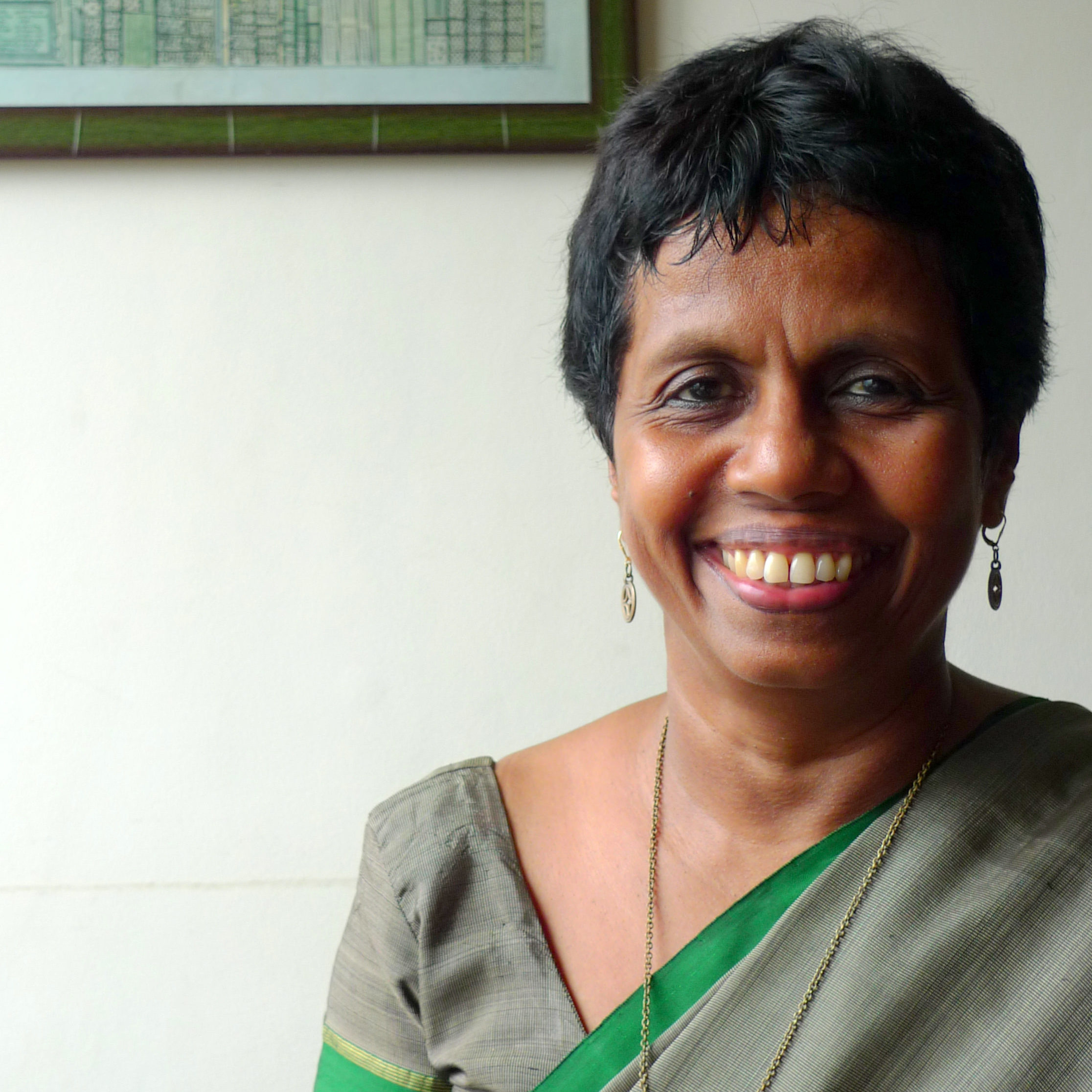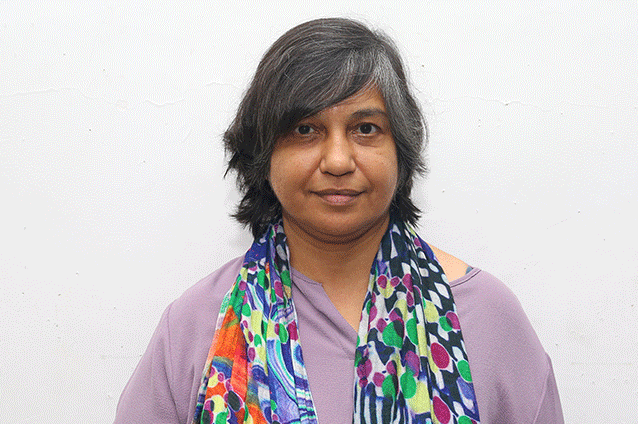.jpg?w=1200)
When schools closed in mid-March of 2020, figuring out the most viable solutions for continued learning for all students became a top priority for Dr. Sujata Gamage and Dr. Tara de Mel — co-coordinators of Education Forum Sri Lanka (EFSL).
After finding that internet-based distance education reached only around 45% of Sri Lankan students in public schools in 2020, their focus shifted to policy action on bridging the digital divide.
Heading an independent platform through which they engage with experts and stakeholders from multiple sectors (education, development and civil society) Drs. Gamage and de Mel began conducting research and convening discussions through their monthly policy dialogues. These dialogues aimed at gathering data and considering interventions to ensure that the pandemic would not drastically disrupt students’ education for long.
Access to quality education has in fact been at the core of EFSL’s advocacy efforts since 2019, which was when they began working side by side as co-coordinators of the organisation. Since then, they have been working on addressing a range of issues affecting early childhood and primary, secondary, and post-secondary levels of education across the country.
The two women have an ambitious agenda and a bright vision for the future of education in Sri Lanka.
Education, Policy And Two Resourceful Women
“On social media, I describe myself as a scientist-turned policy analyst,” said Dr. Gamage, who changed track from teaching chemistry at the Universities of Sri Jayewardenepura and Colombo to education policy-related work at the Ohio Board of Regents and the Ohio State University when she and her family moved to the United States in 1987.
After moving back to Sri Lanka in 2002, Dr. Gamage served as a consultant to the University Grants Commission and was eventually appointed Director General of the Tertiary and Vocational Education Commission (TVEC) where she was a part of the effort to launch the National Vocational Qualification (NVQ) system for Sri Lanka.

In the 1980s, Dr. Tara de Mel was also teaching — as a Senior Lecturer of Physiology at Colombo’s Medical Faculty — after working for three years as a medical doctor at the Children’s Hospital.
Although their paths may have crossed along the hallways of the University of Colombo, it was not until later that the two of them would formally meet.
“I’d always had an interest in education,” Dr. de Mel said, describing her involvement in curriculum reforms that were taking shape in the Colombo Medical Faculty, as well as in her children’s school education.
She recalled that at the school her children attended, learning was very passive, while problem-solving, analysis and discussion/debate were discouraged. Additionally, corporal punishment was practised quite freely. All these experiences would shape her advocacy efforts in time to come.
After being appointed Director at the Sri Lanka Foundation Institute, which was at the time conducting a range of education-related programmes, Dr. de Mel went on to work with then-President Chandrika Bandaranaike Kumaratunga’s Presidential Task Force, overseeing a comprehensive Education Reform Agenda. She was also appointed Vice Chairperson of the National Education Commission.

“As rewarding as it was to work in the President’s Office, it was also challenging because it was a male-dominated atmosphere and because I was the youngest team member,” she said. “Sometimes, it took a while to make people listen.”
Working on sweeping reforms from primary to tertiary education, Dr. de Mel reflected, “for the first time, I felt that my interest and energy invested into education all those years could in fact be channelled towards making an impact nationally.”
Soon, however, she would come to learn how intimately politics was linked to education, and how the implementation of such reforms — “as ideal as they may have been” — would not take place as smoothly as she had hoped.
Dr. Gamage also noted that there are various problems in need of policy solutions, but that the “politics must be right” for these issues to be addressed. “If those in power have no interest, the policy briefs get buried somewhere deep in computer folders,” she said.
She elaborated that policy influence requires what one would call a “policy window,” which she defines as the opportunity that arises when problems, policy solutions and politics come together. “Ideally, advocates should have several policy research papers completed and awaiting a policy window,” she said.
EFSL conducts monthly policy dialogues on a single topic to identify key issues, following which they conduct desk research and primary data collection. This research is then converted into policy briefs that are easily communicated to policy makers.
Politics, Bureaucracy And Challenges To Change
Dr. de Mel noted that Sri Lanka’s national, free education system is currently shackled by political-bureaucratic, inward-looking and narrow-minded tethers.
“Developing education in Sri Lanka and bringing the standard of education to the levels comparable to developed countries means taking a few lessons from other countries in the East and West and emulating what they have done to achieve education compatible with the 21st century,” she said.
Dr. Gamage experienced first-hand the difficulties in bringing about any kind of positive change when she worked on a campaign to realign primary education in the Ampara Education Zone with an activity-based and student-centered approach to teaching and learning.
After two years of work led by the Minister of Education for the Eastern Province, Dr. Gamage and her team had to retreat once the minister lost his portfolio. “The fact that the teachers we were working with were at the same time preparing students for the Grade 5 Scholarship Exam (G5SE) was defeating the purpose of the changes introduced into the teaching and learning process,” she reflected.
“I am convinced that reforming G5SE and removing its reliance on rote learning is essential if we are to make a dent in primary education” she said.
Dr. De Mel shares these feelings, referring to the G5SE as a “monumental disaster for a 10-year-old kid.” Reforming the G5SE is currently one of EFSL’s goals.
Determined Minds, Dedicated To Reform
In 2005, a few years after returning to Sri Lanka, Dr. Gamage initiated EFSL. Although the organisation was founded in 2005, she said, “it was difficult to sustain — and I had almost given up hope — until Tara de Mel came on board in 2019, which was when we began working together as co-coordinators of the Forum.”
After leaving government service in 2005, Dr. de Mel had kept abreast of educational developments and issues, both locally and globally. She felt that efforts taken by the government, and the policies that were adopted by each administration, had no real input from external specialists or from those with serious interest in education.
“I had known Sujata well before, and I had had great respect for her work and interest in education,” Tara said. “I had read many of her articles that periodically get published. So, one bright sunny morning I thought I would share my ideas with her and see how partial she would be towards starting such an initiative, and building a team that would be a dedicated ‘policy think tank’ on education, attempting to catalyse and eventually ‘power’ reforms from outside government.”
Eventually, she reached out to Dr. Gamage about the issue of ragging in universities, which segued into a conversation about other underlying issues in the education system.
Since then, the two have been working together on a range of educational issues — from the issues that face Early Childhood Education to those that face tertiary education.
Dr. de Mel was excited that they shared the same views: “With two determined minds, and zero funds, the EFSL was launched. The rest is history!”
Eyes On The Future
Drs. de Mel and Gamage’s policy reform initiatives focus on equity in access to education and high quality of outcomes. For 2021, to meet this vision, EFSL’s goals include:
- Ensuring that children who have been left behind in education since March 2020 are provided the essentials needed to bridge the digital divide, such as internet and device accessibility
- Ensuring equity in access to good schools and empowering Education Zones and Divisions to develop plans to enable all children to be able to access good schools
- To reduce focus on and content of examinations and shifting attention to transversal competencies.
Ultimately, Drs. Gamage and de Mel wish to influence education in such a way that learning becomes a joyful experience that prepares children for life and work in the 21st century, while contributing towards the growth and development of Sri Lanka.







